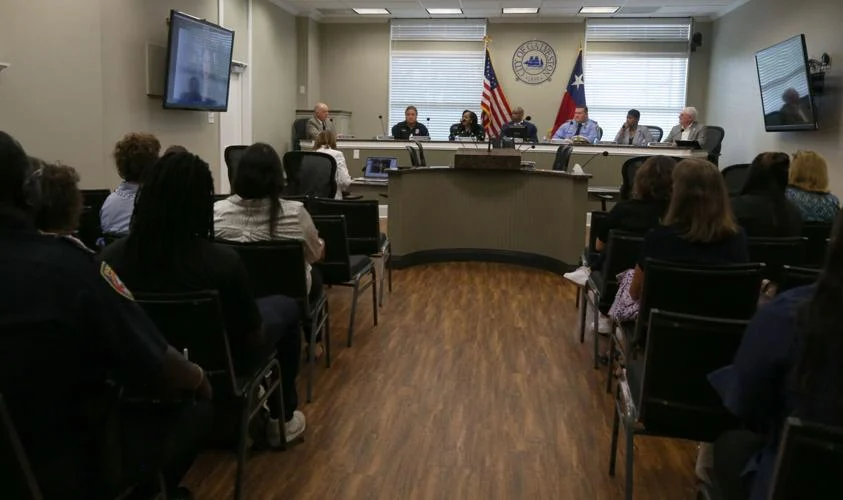Galveston celebrates new mental health unit, hurdles remain

Tony Fabelo, left, a senior fellow of justice policy at the Meadows Mental Health Policy Institute, moderates a roundtable discussion at Galveston City Hall. Galveston officials announced the launch of a multi-disciplinary response team to respond to 911 calls involving people with mental health or substance use needs.
The city of Galveston on Thursday publicly committed to a bold new policing initiative that will create a unit to be dispatched when people are having mental health crises.
Billed as a way to help connect people in need with proper services, instead of sending them to jail, and as a way to free up city resources for police officers and firefighters to respond to other emergencies, the new unit is expected to roll out by October.
It has the financial backing of half a dozen local charitable groups and of The Pew Charitable Trusts.
During a roundtable announcing the initiative on Thursday, however, officials acknowledged there are hurdles to overcome before the launch of the program.
“We have to be patient,” said Galveston Police Chief Doug Balli. “There’s going to be hiccups. We have to iron out the wrinkles.”
The city has to find the people to be part of the unit and have a plan to negotiate around gaps such as a lack of hospital beds in mental health resources on the island and in the county.
With the city’s budget season approaching, the police department would be asking the city to purchase a new, unmarked vehicle for the mental health unit to use, Balli said.
The police officers who will work in the unit likely will come from the city’s ranks, Balli said.
Officer shortages could affect the program’s ability to get going, Balli said. The department has 16 open positions, but has recently offered conditional employment to four people.
“We have to overcome our vacancies to get this off the ground and allocate people to it,” Balli said.
Police officers, firefighters and emergency dispatchers also will need to be trained for the program’s new procedures, said B.J. Wagner, of the Meadows Mental Health Policy Institute, the nonprofit organization that’s helping to design and implement the program.
It was especially important emergency dispatchers be trained and skilled at identifying calls appropriate for the new unit to handle, she said.
“Those communication professionals are critical in determining how to route a call,” Wagner said. “The communications center needs to be fully prepared.”
Aside from those challenges, the new unit also will have to compensate for a lack of mental health facilities on the island.
Tiffany Russell, the CEO of the Gulf Coast Center, a Galveston-based nonprofit that helps provide mental health services in Galveston and Brazoria counties, said the group hoped to establish an observation unit that would give people in an urgent crisis a place to stay for up to 48 hours.
“We need that extended observation unit or a diversion center or 24-hour observation unit or all of it,” Russell said.
The Gulf Coast Center already operates a facility in Texas City where people can stay for up to 14 days.
But people in more urgent situations who need inpatient care must be taken to St. Joseph’s Hospital in Houston because Galveston County doesn’t have a hospital that offers in-patient mental health care.
The University of Texas Medical Branch closed its mental health facilities in 2009.
Recently, medical branch officials have said they plan to reestablish some mental health services at the renovated John Sealy Hospital, but don’t plan to offer inpatient beds.
The coming months also will be used to figure out how the mental health unit can be personalized to Galveston, officials said. The concept is based on a system already established in Dallas.
But because Galveston is much smaller, the program will look different and not operate on a 24/7 schedule.
The police department is analyzing data to determine the best time to have the mental health unit on duty, Balli said. The police department is working with limited data because it started tracking mental health calls only in 2019, Balli said.
“We’re trying to dig in and find what our numbers are,” Balli said.
The changes needed to the program emphasize its experimental nature, officials said. The program’s coordinators will be tracking how successful the program is, which could determine whether it makes it past the pilot stage and receives a long-term funding commitment from the city.
“We’re going to tell you if it doesn’t work,” said Tony Fabelo, the senior fellow of justice policy at the Meadows Mental Health Policy Institute. “If it works, we’re going to do it. If it doesn’t work, we’re going to figure out why.
“This is not easy.”

NEWS
Hide Full Index
Show Full Index
View All News